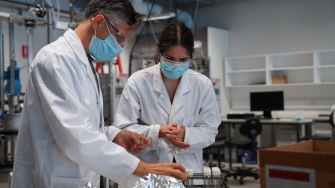Making food and beverage wastewater more green
A group of UNSW students have been brewing something exciting in the lab.
A group of UNSW students have been brewing something exciting in the lab.

Tina Ventoura, a 5th year Chemical Engineering student, along with her peers have been working closely with industry and academics to build and design the technology and infrastructure to efficiently source hydrogen from renewable food waste streams.
This is a part of UNSW Engineering’s Vertically integrated Project Biotic-H2, which gives students experience in a real long-term research project.
Being completely honest, out of high school I really had no idea what Chemical Engineering was, but I loved Maths and Chemistry and thought it was a good way to bridge both of those together. Little did I know there’s very little actual Chemistry in the degree, but I’ve come to really enjoy it regardless!
I’ve been part the Biotic-H2 VIP team for two years now. We’ve been looking at taking food and beverage waste streams and turning it into hydrogen via electrolysis. The VIP team is broken into two smaller sub-teams, the Water Team, who work on the feasibility of different waste streams and the various pre-treatment required to make it suitable for downstream electrolysis, and the Catalysis Team, who focus on developing the electrode and catalyst materials.
I was interested in both the idea of working on a year-long student-led project and also the specific topic and research area.
I’ve learnt a whole range of different non-technical and technical things over the two years. It’s great to be able to work on state of the art pieces of equipment and learn from academics and fellow students, but the greatest thing I’ve gotten out of the experience has been the project management and communication aspects of the work, which are definitely very transferrable skills irrespective of the industry you’re interested in.
Getting to work on a year-long research project is a really unique experience for an undergrad! It’s a great way to get a taste for what research is like at UNSW, and is really great practise for your honours thesis. Depending on your project, you get to collaborate and work with many different people, from students in other faculties, to PhD students as well as industry partners.
I’ve also found working directly with academics really valuable for me as I’ve been able to learn about their research areas in a more practical sense versus the typical theoretical sense you’d get in a classroom or lecture. Rather than simply learning about a concept or doing practise questions, you get to learn about more novel techniques or pieces of equipment that are still early on in their development. There’s so much research going on at UNSW and it can be quite hard to figure out what you’re interested in, so I’ve found that VIP is a great way to figure that out earlier on in your degree before you choose your discipline electives in your fourth/final years. You also get to build rapport with many different academics and postgrads, which helps especially if you’re interested in taking on a thesis or research project with them as you never know what opportunities may come up down the line.
Apply to enrol in Biotic-H2 or one of our other Vertical Integrated Projects on offer.